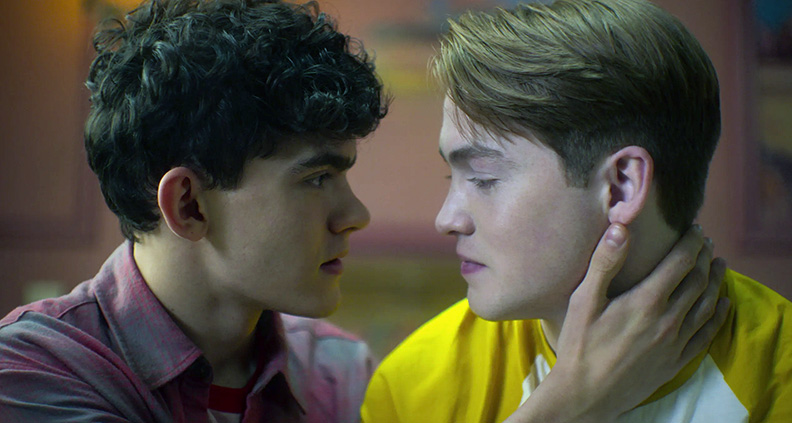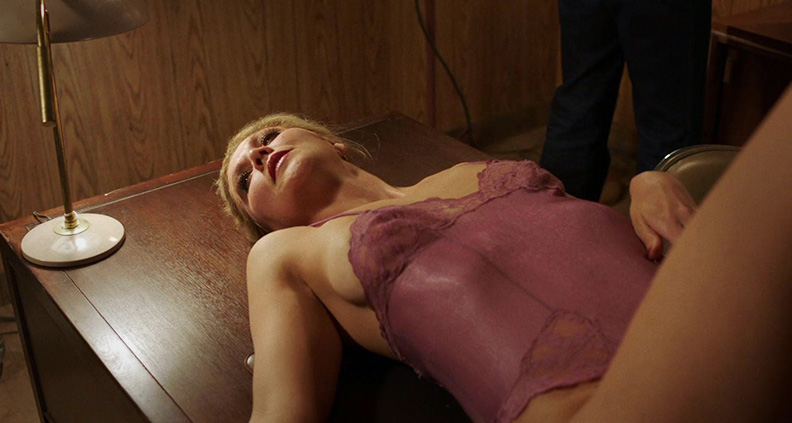As the film community continues to process the fallout of the #MeToo movement and keeps growing in its awareness of the trauma caused by the mishandling of actors on set, a critical new production role has emerged: the intimacy coordinator (IC). But while the role has been largely welcomed by the industry since it started appearing on call sheets in 2017 the job is still widely misunderstood. To teach our community more about the value a skilled IC can bring to a project, Film Independent Education’s Filmmaker Tuesdays invited intimacy coordinator Rebecca Johannsen–of Intimacy Professionals Association (IPA)–to hold a group workshop around the topic on April 23 at Film Independent’s Wilshire Boulevard HQ. Johannsen is a highly-acclaimed IC who boasts a diverse resume. Her credits include two Film Independent Spirit Award-nominated films, Palm Trees and Power Lines and To Leslie, along with television projects such as Netflix’s Griselda and Max’s Bookie. Johannsen trained under Amanda Blumenthal–one of the innovators in the field and founders of the IPA–and oversees continuing education programs for the organization.
When do you need an IC?
The content of your film is the starting point when deciding if an intimacy coordinator is necessary on your set. Any film with scenes of intimacy, nudity or simulated sex should consider hiring an IC. Johannsen suggests utilizing a three-tier system when making this important decision: Tier 1 defines when an intimacy coordinator should be required and includes projects that feature nudity, simulated sex (including simulated masturbation) or simulated sexual violence, and anything that requires a rider. An intimacy coordinator is highly recommended for Tier 2. Make-out scenes/heavy kissing, implied nudity, groping, and kissing involving a minor all fit under this category. Tier 3 is when hiring an IC should be considered and that is when a director, producer or performer would like an IC to be present to facilitate a scene.
Why should you hire an intimacy coordinator?
The hiring of an intimacy coordinator comes with a cost (obviously) but it’s also important to consider how this extension of your team can protect actors, improve the film and even save the production money. First and foremost, an IC is there to emotionally and physically protect actors. The intimacy coordinator functions as an advocate for all parties on set and ensures that everyone is respected and safe. Performers can be traumatized or harmed during the filming of these scenes, so the situation should be handled delicately at all times. In addition to the ethical reasons to hire an IC, the presence of an IC can actually save the production money in several ways. Lawsuits are a very real possibility when dealing with scenes of intimacy, and an IC can help you avoid these nightmares. Navigating federal and state laws and the constantly evolving SAG-AFRTA protocols is something a trained IC will be able to handle with ease. An intimacy coordinator can also improve efficiency on set. They are adept at having the conversations necessary to keep the film moving along without interruption. The last thing to consider is that an intimacy coordinator can actually make your project look better! Intimacy coordinators are highly trained on movement choreography, optimizing camera angles and can offer ideas and alternatives when the initial plan isn’t working. The performances given by actors can often also be more effective and naturalistic as well since they can focus on acting and be completely comfortable.
What are the tasks performed by an IC at various stages of production?
“Ninety percent of our job is done in prep. If you don’t see me doing very much on the day, I’ve done my job well,” Johannsen stated, underscoring the importance of the work done by an IC before the day of the shoot. Prep includes a script breakdown of nudity/simulated sex scenes, separate meetings with the crew and actors individually to discuss the details and vision for each party, negotiations, coordination with legal, collaboration with costumes, props and makeup, plus rehearsals. On the day of the shoot, the highly prepared IC will do a final review of nudity riders, scene content and modesty garments with actors, coordinate rehearsals, enforce closed-set protocol, supervise the shoot to make sure boundaries are respected, nudity riders are obeyed and scenes look realistic. Intimacy coordinators are not typically involved with post-production, but sometimes offer ADR support. Intimacy coordinators are also great resources to use as script consultants in certain situations.
Tips for success when hiring an IC and setting them up to succeed
It’s important to start the process of hiring an intimacy coordinator as early as possible. You may want to interview several potential options to see which is the best fit for your project and preferred work style. Also, an IC brought on early is more likely to be prepared, feel like a valued member of the team and can offer suggestions to avoid issues later in the process. The content of your film will heavily influence what you look for in an IC. While all trained intimacy coordinators have certain skill sets and training, their specialties will vary. For example, films with content that includes kink, BDSM, childbirth, or sexual violence may lead you to select an IC that specializes in that content. Finding the right IC for your particular project is vital.
Intimate scenes on a budget
While it’s a drop in the bucket for a larger production to hire an IC, an indie film may simply not be able to afford one. An experienced intimacy coordinator can run in the neighborhood of $1,400 per day, but there are alternatives when this simply isn’t feasible for your budget. Hiring a less-experienced, but still highly trained, IC is one option. There are many talented people who are new to the position and looking to gain hours of experience who may be willing to work at a largely reduced rate. Reaching out to an experienced intimacy coordinator and asking them for someone they recommend is often a great strategy. If the project can’t even afford a lower-priced IC, it may be time to reconsider the inclusion of the scene of intimacy altogether. Sometimes cutting or redesigning the scene can actually lead to a scene that better serves the story. For more, please see this video piece from our online tutorial series Tools of the Trade, featuring NY-based intimacy coordinator Heather Marie Ācs:
For over 40 years, Film Independent has helped filmmakers get their projects made and seen. The nonprofit organization’s core mission is to champion creative independence in visual storytelling and support a community of artists who embody diversity, innovation and uniqueness of vision. Film Independent Members watch nominees and vote for the winners of the Spirit Awards. To become a Member of Film Independent and make your vote count for next year’s 40th Annual Spirit Awards, just click here. To support our mission with a donation, click here.
Keep up with Film Independent…
Twitter Instagram Facebook YouTube Events Letterboxd Newsletter
(Header: A depiction of an intimacy coordinator’s work on the HBO series High Maintenance)




